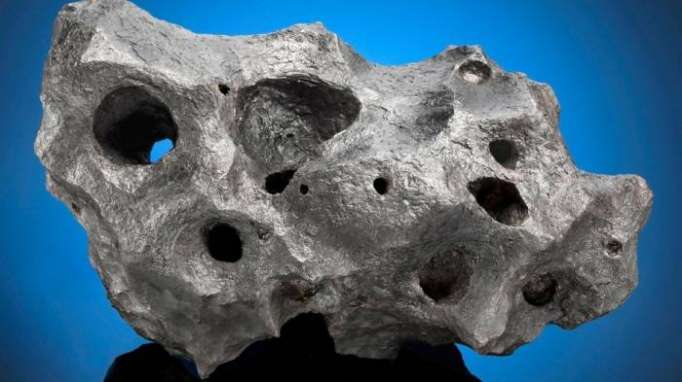Weighing in at 70 lbs. (32 kilograms), this meteorite is made of iron and comes from the Barringer Meteorite Crater, also known as Meteor Crater, located near Winslow, Arizona. The meteorite originated from a small asteroid roughly 130 feet (40 meters) wide.
Previous studies estimate the rock slammed into the ground with the force of more than 100 atomic bombs, creating a large impact crater that measures some 570 feet deep and 4,100 feet (1.25 kilometers) across. In fact, Meteor Crater is considered one of the most famous and best-preserved meteorite craters on Earth.
The meteorite was part of Christie's "Deep Impact: Martian, Lunar and Other Rare Meteorites" online auction. The auction house estimated the meteorite would sell for between $150,000 and $250,000, but the actual take of a whopping $237,500 was the highest price for a meteorite sold through an online Christie's auction.
"While the world's fascination with meteorites is roaring, the market for sculptural iron meteorites has exploded — and rightly so," Darryl Pitt, curator of the Macovich Collection of Meteorites in New York City, said in a statement. "Less than 2 percent of all meteorites are of the iron variety, and less than 5 percent of those are aesthetic and deservedly regarded as natural sculpture from outer space."
The auction took place on Wednesday, Feb. 14. Among the high-selling meteorites was an unusual, highly textured iron meteorite from Russia that went for $81,250, as well as a half-pound (0.2 kg) Mars meteorite that sold for $47,500. There was also a 3-lb. (1.4 kg) iron meteorite that sold for $10,625 and a striking meteorite with extraterrestrial gemstones that sold for $5,250, according to the statement.
Also on display at the auction was a meteorite that resulted from the fireballseen over Michigan in January, which will be sold during another Christie's auction in April.
"The meteorite market is in its nascent stage," Pitt said in the statement. "Highly aesthetic meteorites are penetrating the art market and will soon be selling for an order of magnitude more than what was seen today."
More about: #Arizona
















































